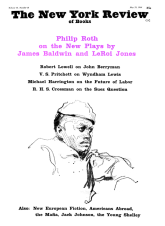In response to:
Upper West-Side Story from the April 16, 1964 issue
To the Editors:
I’m writing to inquire whether Stanley Edgar Hyman’s review of Diana Trilling’s Claremont Essays was intended to be a parody. (Indeed, on the basis of some of the passages Mr. Hyman quotes I suspect I’d have the same uncertainty about the Essays themselves. Actually, the combination of Mrs. Trilling and Mr. Hyman is probably the source of my confusion.) My question is not facetious; that is to say, I’m not writing with the certainty that it wasn’t intended as such, merely to mock Mr. Hyman as a writer and a man. I think the ambiguity is really there.
Is it possible that the long paragraph on Mrs. Trilling’s essay about the love-poem Allen Ginsberg wrote to her husband was not written with tongue in cheek?
“‘Pious sentimentality,’ she says, ruthlessly, of Dr. Mead’s conclusion.” Is this sentence written seriously? When Mr. Hyman states that an essay on Caruso “concludes beautifully” and then quotes the passage about the “great noble animals and their long death throes,” isn’t he being sarcastic? And likewise for the paragraph about Freud?
What about Mr. Hyman’s comment on Camus? “…his work has one great historical importance: it showed us that ultimately the issues are not political but moral.” Is this a joke, the point being that Mr. Hyman thinks Camus was simple-minded?
And yet the concluding paragraph—unless it is the epitome of an extraordinarily subtle and supple parody—seems to be in dead earnest. There are three possibilities: Mr. Hyman’s review is an intentional parody, or it is definitely not a parody, or it is an unconscious parody. If it is one of the first two, I am unquestionably out of touch. If it is the last, I think my confusion is justified, since such parodies are bound to be somewhat uneven.
Martin Glass
San Francisco, California
This Issue
May 28, 1964



